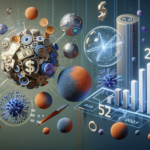Understanding Depression: A Closer Look at Its Impact
Depression is a complex mental health condition that affects millions of people worldwide. It goes beyond mere sadness, impacting one’s ability to function in daily life. The World Health Organization estimates that over 264 million people suffer from depression globally, making it a leading cause of disability. Understanding the depth and breadth of depression is crucial in addressing its impact effectively.
Depression is characterized by persistent feelings of sadness, hopelessness, and a lack of interest or pleasure in activities once enjoyed. It can also manifest physically, with symptoms such as fatigue, changes in appetite, and sleep disturbances. These symptoms can vary in intensity and duration, often leading to significant impairments in social, occupational, or other important areas of functioning.
One of the most challenging aspects of depression is its ability to distort thinking. Individuals may experience cognitive distortions, such as negative self-talk and a pessimistic outlook on life. This can create a vicious cycle, where negative thoughts fuel depressive symptoms, which in turn reinforce negative thinking.
Understanding depression requires acknowledging its multifaceted nature. It can be influenced by a combination of genetic, biological, environmental, and psychological factors. For instance, a family history of depression may increase one’s risk, while stressful life events or trauma can trigger its onset. Furthermore, imbalances in brain chemicals, such as serotonin and dopamine, are also associated with depression.
In summary, depression is a pervasive and debilitating condition that affects individuals on multiple levels. Recognizing its complexity and the various factors that contribute to its development is essential for effective intervention and support.
Recognizing the Symptoms: When Sadness Becomes Something More
Sadness is a natural human emotion, but when it becomes overwhelming and persistent, it may be indicative of depression. Recognizing the symptoms of depression is a critical step in seeking help and finding relief. While symptoms can vary from person to person, there are common signs to be aware of.
Emotional symptoms are often the most noticeable. These include persistent feelings of sadness, emptiness, or hopelessness. Individuals may also experience irritability, frustration, or a sense of worthlessness. It’s not uncommon for people with depression to lose interest in activities they once found pleasurable, leading to social withdrawal and isolation.
Physical symptoms can also be present. These may include changes in appetite or weight, sleep disturbances, and a lack of energy. Some individuals may experience unexplained aches and pains, which can further compound feelings of distress.
Cognitive symptoms are another hallmark of depression. These can include difficulty concentrating, making decisions, or remembering information. Negative thought patterns, such as self-criticism or excessive guilt, are also common. In severe cases, individuals may have thoughts of death or suicide, which require immediate attention and intervention.
It’s important to note that not everyone with depression will experience all of these symptoms. The severity and combination of symptoms can vary, making it essential to seek professional evaluation if depression is suspected. Early recognition and intervention can significantly improve outcomes and prevent the condition from worsening.
In conclusion, recognizing the symptoms of depression is key to understanding when sadness has crossed the line into a more serious mental health issue. Awareness and education can empower individuals to seek help and support when needed.
Exploring the Causes: What Contributes to Depression?
Depression is a multifaceted condition with a variety of contributing factors. Understanding these causes can provide insight into why some individuals are more susceptible than others. While the exact cause of depression is not fully understood, research suggests a combination of genetic, biological, environmental, and psychological factors play a role.
Genetics can influence the risk of developing depression. Studies have shown that individuals with a family history of depression are more likely to experience it themselves. This suggests a hereditary component, although specific genes have yet to be definitively identified.
Biological factors, such as imbalances in brain chemistry, are also associated with depression. Neurotransmitters like serotonin, norepinephrine, and dopamine are thought to play a role in mood regulation. Abnormalities in these chemicals can contribute to the development of depressive symptoms.
Environmental factors can trigger or exacerbate depression. Stressful life events, such as the loss of a loved one, divorce, or financial difficulties, can increase vulnerability. Additionally, exposure to trauma or abuse, especially during childhood, can have long-lasting effects on mental health.
Psychological factors, including personality traits and coping mechanisms, can influence depression. Individuals with low self-esteem, a tendency towards pessimism, or difficulty handling stress may be more prone to developing depression.
Moreover, chronic medical conditions and certain medications can also contribute to depression. Conditions such as chronic pain, diabetes, or heart disease can increase the risk, as can medications like corticosteroids or certain blood pressure drugs.
In summary, depression is a complex condition with multiple contributing factors. Understanding these causes can help in developing targeted interventions and support strategies for those affected.
Treatment Options: Paths to Recovery and Hope
Depression is a treatable condition, and there are various paths to recovery that offer hope to those affected. Treatment is often tailored to the individual’s specific needs and may involve a combination of approaches.
Psychotherapy, or talk therapy, is a common treatment for depression. Cognitive-behavioral therapy (CBT) is one of the most effective forms, helping individuals identify and change negative thought patterns and behaviors. Other forms of therapy, such as interpersonal therapy (IPT) or psychodynamic therapy, may also be beneficial depending on the individual’s needs.
Medication is another option for treating depression. Antidepressants, such as selective serotonin reuptake inhibitors (SSRIs) or serotonin-norepinephrine reuptake inhibitors (SNRIs), can help regulate brain chemistry and alleviate symptoms. It’s important to note that medication may take several weeks to show effects, and finding the right medication and dosage can require time and adjustments.
In addition to therapy and medication, lifestyle changes can play a significant role in managing depression. Regular exercise, a balanced diet, and adequate sleep are essential components of a holistic treatment plan. Engaging in activities that promote relaxation and stress reduction, such as yoga or meditation, can also be beneficial.
Support from family and friends is crucial in the recovery process. Encouragement and understanding from loved ones can provide motivation and comfort. Support groups, whether in-person or online, offer a sense of community and shared experience, which can be incredibly reassuring.
In severe cases, more intensive treatments may be necessary. Electroconvulsive therapy (ECT) or transcranial magnetic stimulation (TMS) are options for individuals who do not respond to traditional treatments. These therapies involve stimulating specific areas of the brain to alleviate symptoms.
In conclusion, there are numerous treatment options available for depression, each offering a pathway to recovery and renewed hope. Seeking professional help and exploring these options can lead to significant improvements in quality of life.
Living with Depression: Strategies for Coping and Thriving
Living with depression can be challenging, but there are strategies that can help individuals cope and even thrive despite the condition. Developing a personalized plan that incorporates various coping mechanisms is essential for managing symptoms effectively.
One of the first steps in coping with depression is acknowledging the condition and seeking help. This can involve reaching out to a mental health professional for diagnosis and treatment. Accepting the need for support is a crucial part of the healing process.
Building a strong support network is vital. This includes family, friends, and support groups who can provide encouragement and understanding. Open communication with loved ones about one’s feelings and needs can foster a supportive environment.
Establishing a routine can provide structure and stability. This includes setting regular sleep patterns, meal times, and incorporating physical activity into daily life. Exercise has been shown to have a positive impact on mood and can be a powerful tool in managing depression.
Mindfulness and relaxation techniques, such as meditation or deep breathing exercises, can help reduce stress and promote emotional well-being. These practices encourage individuals to focus on the present moment, reducing the impact of negative thoughts.
Setting realistic goals and celebrating small achievements can boost self-esteem and motivation. Breaking tasks into manageable steps can prevent feelings of overwhelm and encourage progress.
Engaging in hobbies and activities that bring joy and fulfillment is important. Whether it’s painting, gardening, or volunteering, finding activities that provide a sense of purpose and enjoyment can be incredibly beneficial.
In summary, living with depression involves a multifaceted approach that includes seeking help, building a support network, and incorporating healthy habits into daily life. With the right strategies, individuals can manage their symptoms and lead fulfilling lives.








